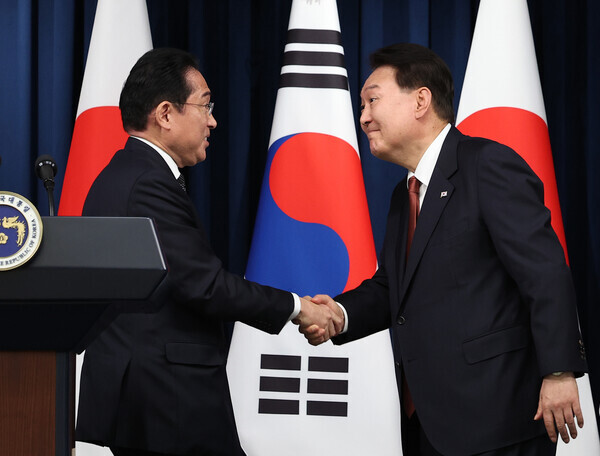hankyoreh
Links to other country sites 다른 나라 사이트 링크
[Editorial] Korea-Japan summit underscores future without apology for past

During a summit in Seoul on Sunday, President Yoon Suk-yeol and Prime Minister Fumio Kishida reiterated the importance of “future cooperation” between them, including stronger trilateral security cooperation with the US.
The matter of unresolved historical issues between the two sides had been a focus of some interest, but while Kishida said that his “heart ached to think of the difficulty and sad experiences” of forced labor mobilization victims, he did not share any message of remorse or apology on behalf of the Japanese government.
His remarks could be seen as a minimum expression of good faith — but hardly enough to fill the empty half of the cup.
In the leaders’ joint press conference that day, Kishida explained, “When President Yoon visited Japan last March, I clearly communicated that we would be fully carrying on the position of past Cabinets on the Japan-South Korea Joint Declaration of 1988.”
The prevailing view is that the “position of past Cabinets” cannot be seen as an apology, since it also encompasses the later former Prime Minister Shinzo Abe’s statement stressing that current and future generations must not be “predestined to apologize” for Japan’s wartime actions.
Kishida did share regrets regarding the forced mobilization victims, albeit only as an expression of personal opinion. The two leaders also made plans to pay a joint visit to pay respects at a memorial to Korean atomic bomb victims during the Group of Seven summit in Hiroshima later this month.
While there has been some progress, this is still a long way from the sort of good-faith response that South Koreans had been hoping for. Meanwhile, Yoon seemed to back Japan’s position on historical issues, insisting that “what is important is that [the parties] act with sincerity” and that he did not “see this is an issue where we can place unilateral demands on the other side.”
Instead of historical issues, the two leaders’ emphasis was on economic and security-related cooperation.
Commenting in the press conference on the recent Washington Declaration including plans for a South Korea-US Nuclear Consultative Group, Yoon said this framework “does not rule out Japan’s participation.” By opening up the possibility for Tokyo to take part in South Korea and the US’ discussions on strengthening extended deterrence, he was hastening the arrival of close-knit military cooperation at the level of a “quasi-alliance.”
With regard to Japan’s plans for releasing contaminated water from the Fukushima Daiichi nuclear power plant into the ocean, the two leaders agreed on Sunday to have South Korean experts visit the site and conduct inspections.
These on-site inspections by South Korean experts are a positive step, in that they provide an opportunity for us to conduct our own examination of the contaminated water situation. At the same time, this is not a system where South Korea would be able to intervene in a practical sense on the water’s release, and we should pay heed to the comments that some have raised about how this could easily end up used by the Japanese government as a justification for dumping the water.
The latest South Korea-Japan summit was an occasion for proclaiming the return of “shuttle diplomacy.” It was the first time in 12 years that a Japanese prime minister visited South Korea to attend bilateral talks.
The two leaders stressed the importance of economic and security cooperation for the “future.” But past issues cannot simply be overlooked, since they are a matter of ensuring historical justice.
We cannot lose sight of the fact that a forward-looking relationship between South Korea and Japan must start with a clear understanding of historical issues.
Please direct questions or comments to [english@hani.co.kr]

Editorial・opinion
![[Column] Season 2 of special prosecutor probe may be coming to Korea soon [Column] Season 2 of special prosecutor probe may be coming to Korea soon](https://flexible.img.hani.co.kr/flexible/normal/500/300/imgdb/original/2024/0426/3317141030699447.jpg) [Column] Season 2 of special prosecutor probe may be coming to Korea soon
[Column] Season 2 of special prosecutor probe may be coming to Korea soon![[Column] Park Geun-hye déjà vu in Yoon Suk-yeol [Column] Park Geun-hye déjà vu in Yoon Suk-yeol](https://flexible.img.hani.co.kr/flexible/normal/500/300/imgdb/original/2024/0424/651713945113788.jpg) [Column] Park Geun-hye déjà vu in Yoon Suk-yeol
[Column] Park Geun-hye déjà vu in Yoon Suk-yeol- [Editorial] New weight of N. Korea’s nuclear threats makes dialogue all the more urgent
- [Guest essay] The real reason Korea’s new right wants to dub Rhee a founding father
- [Column] ‘Choson’: Is it time we start referring to N. Korea in its own terms?
- [Editorial] Japan’s rewriting of history with Korea has gone too far
- [Column] The president’s questionable capacity for dialogue
- [Column] Are chaebol firms just pizza pies for families to divvy up as they please?
- [Column] Has Korea, too, crossed the Rubicon on China?
- [Correspondent’s column] In Japan’s alliance with US, echoes of its past alliances with UK
Most viewed articles
- 1‘We must say no’: Seoul defense chief on Korean, USFK involvement in hypothetical Taiwan crisis
- 2After election rout, Yoon’s left with 3 choices for dealing with the opposition
- 3Why Kim Jong-un is scrapping the term ‘Day of the Sun’ and toning down fanfare for predecessors
- 4AI is catching up with humans at a ‘shocking’ rate
- 5[Editorial] Korea’s surprise Q1 growth requires objective assessment, not blind fanfare
- 6Noting shared ‘values,’ Korea hints at passport-free travel with Japan
- 7Two factors that’ll decide if Korea’s economy keeps on its upward trend
- 8Gangnam murderer says he killed “because women have always ignored me”
- 9South Korea officially an aged society just 17 years after becoming aging society
- 10The dream K-drama boyfriend stealing hearts and screens in Japan